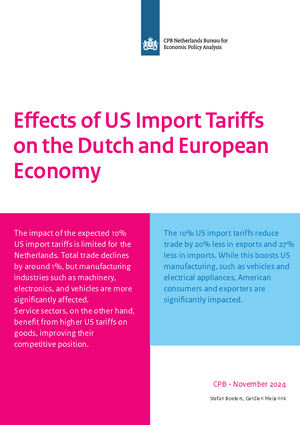Effects of US Import Tariffs on the Dutch and European Economy
American Trade Mostly Affected by Announced Import Tariffs

According to a CPB report released today, the announced US import tariffs will lead to over 20% less import, resulting in increased production in the US manufacturing sector, including vehicles and electrical appliances. The study analyzes Trump’s proposed measures: a general 10% import tariff, a specific 100% tariff on vehicles, and a 60% tariff on all Chinese goods. Statements made earlier this week by Trump about additional tariffs for Canada, Mexico, and China were not included in the study.
Impacts on the Netherlands and Europe
Exports to the US account for only 4–5% of total Dutch exports, meaning the impact of the announced US tariffs will be very limited. However, for certain sectors, the effect is more significant due to their relatively high export share to the US. For instance, production in the Netherlands will decline for machinery and equipment (-6%), electronic and optical products (-5.7%), and vehicles (-5.3%). Meanwhile, Dutch service providers in telecommunications, aviation, and machinery and equipment leasing will benefit as US services become more expensive, leading to a production increase of about 3% for these sectors. Short-term adjustment costs, such as investments in capacity or reallocating resources, are expected.
The broader EU economy faces similar impacts; vehicle production (-6.1%), particularly due to the specific 100% tariff on vehicles, and the pharmaceutical sector (-4.9%) will be relatively more affected.
Limited Impact of Potential Retaliation
The CPB also examined the potential effects of EU retaliation. A scenario where the EU imposes a 10% tariff on all imported US goods shows a very minor impact on US trade. However, such a measure would also slightly reduce both imports and exports in the Netherlands and Europe. This would lead to shifts in production patterns within Europe, with European countries increasing trade with other parts of the world.
Policy uncertainty in the US is currently high, and it remains unclear how other countries will respond. The recent CPB study on US relations highlighted broader economic interdependencies with America beyond trade. Potential policy changes could have significant impacts on those areas. The CPB will provide further analysis of these uncertainties in its upcoming Central Economic Plan (February) and the annual Financial Markets Risk Report (May).
Downloads
Authors


